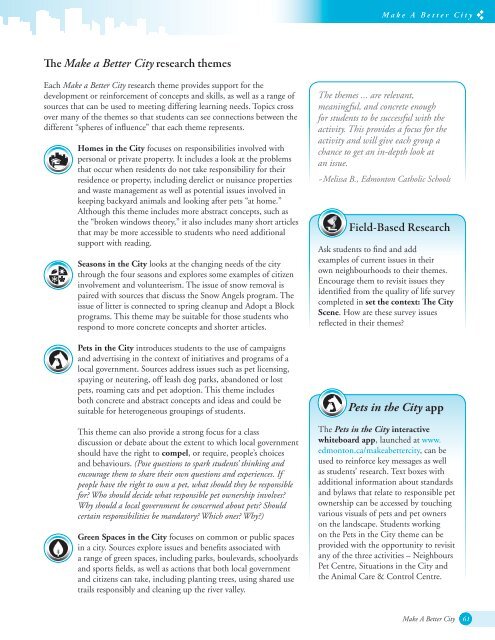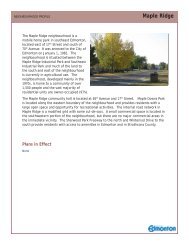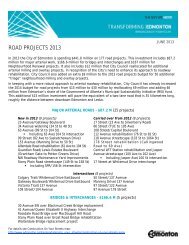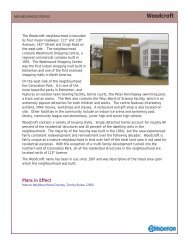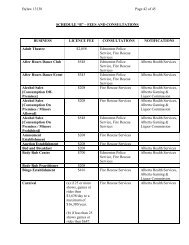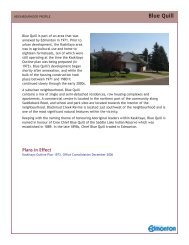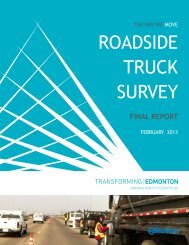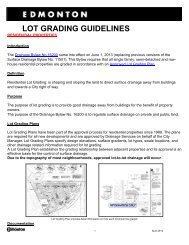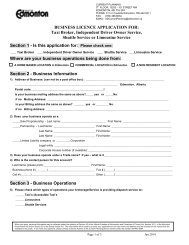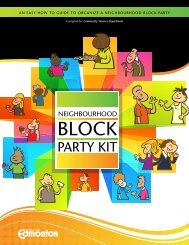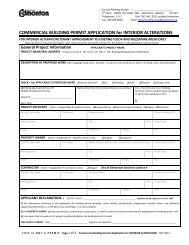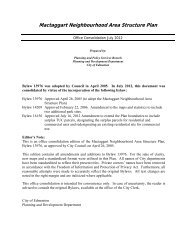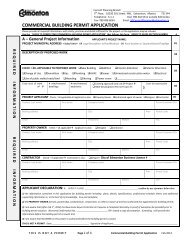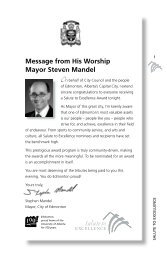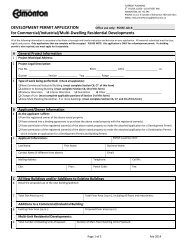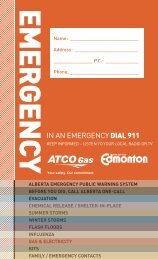Full Resource - City of Edmonton
Full Resource - City of Edmonton
Full Resource - City of Edmonton
Create successful ePaper yourself
Turn your PDF publications into a flip-book with our unique Google optimized e-Paper software.
Make A Better <strong>City</strong><br />
The Make a Better <strong>City</strong> research themes<br />
Each Make a Better <strong>City</strong> research theme provides support for the<br />
development or reinforcement <strong>of</strong> concepts and skills, as well as a range <strong>of</strong><br />
sources that can be used to meeting differing learning needs. Topics cross<br />
over many <strong>of</strong> the themes so that students can see connections between the<br />
different “spheres <strong>of</strong> influence” that each theme represents.<br />
Homes in the <strong>City</strong> focuses on responsibilities involved with<br />
personal or private property. It includes a look at the problems<br />
that occur when residents do not take responsibility for their<br />
residence or property, including derelict or nuisance properties<br />
and waste management as well as potential issues involved in<br />
keeping backyard animals and looking after pets “at home.”<br />
Although this theme includes more abstract concepts, such as<br />
the “broken windows theory,” it also includes many short articles<br />
that may be more accessible to students who need additional<br />
support with reading.<br />
Seasons in the <strong>City</strong> looks at the changing needs <strong>of</strong> the city<br />
through the four seasons and explores some examples <strong>of</strong> citizen<br />
involvement and volunteerism. The issue <strong>of</strong> snow removal is<br />
paired with sources that discuss the Snow Angels program. The<br />
issue <strong>of</strong> litter is connected to spring cleanup and Adopt a Block<br />
programs. This theme may be suitable for those students who<br />
respond to more concrete concepts and shorter articles.<br />
Pets in the <strong>City</strong> introduces students to the use <strong>of</strong> campaigns<br />
and advertising in the context <strong>of</strong> initiatives and programs <strong>of</strong> a<br />
local government. Sources address issues such as pet licensing,<br />
spaying or neutering, <strong>of</strong>f leash dog parks, abandoned or lost<br />
pets, roaming cats and pet adoption. This theme includes<br />
both concrete and abstract concepts and ideas and could be<br />
suitable for heterogeneous groupings <strong>of</strong> students.<br />
This theme can also provide a strong focus for a class<br />
discussion or debate about the extent to which local government<br />
should have the right to compel, or require, people’s choices<br />
and behaviours. (Pose questions to spark students’ thinking and<br />
encourage them to share their own questions and experiences. If<br />
people have the right to own a pet, what should they be responsible<br />
for Who should decide what responsible pet ownership involves<br />
Why should a local government be concerned about pets Should<br />
certain responsibilities be mandatory Which ones Why)<br />
Green Spaces in the <strong>City</strong> focuses on common or public spaces<br />
in a city. Sources explore issues and benefits associated with<br />
a range <strong>of</strong> green spaces, including parks, boulevards, schoolyards<br />
and sports fields, as well as actions that both local government<br />
and citizens can take, including planting trees, using shared use<br />
trails responsibly and cleaning up the river valley.<br />
The themes ... are relevant,<br />
meaningful, and concrete enough<br />
for students to be successful with the<br />
activity. This provides a focus for the<br />
activity and will give each group a<br />
chance to get an in-depth look at<br />
an issue.<br />
~Melissa B., <strong>Edmonton</strong> Catholic Schools<br />
Field-Based Research<br />
Ask students to find and add<br />
examples <strong>of</strong> current issues in their<br />
own neighbourhoods to their themes.<br />
Encourage them to revisit issues they<br />
identified from the quality <strong>of</strong> life survey<br />
completed in set the context: The <strong>City</strong><br />
Scene. How are these survey issues<br />
reflected in their themes<br />
Pets in the <strong>City</strong> app<br />
The Pets in the <strong>City</strong> interactive<br />
whiteboard app, launched at www.<br />
edmonton.ca/makeabettercity, can be<br />
used to reinforce key messages as well<br />
as students’ research. Text boxes with<br />
additional information about standards<br />
and bylaws that relate to responsible pet<br />
ownership can be accessed by touching<br />
various visuals <strong>of</strong> pets and pet owners<br />
on the landscape. Students working<br />
on the Pets in the <strong>City</strong> theme can be<br />
provided with the opportunity to revisit<br />
any <strong>of</strong> the three activities – Neighbours<br />
Pet Centre, Situations in the <strong>City</strong> and<br />
the Animal Care & Control Centre.<br />
Make A Better <strong>City</strong> 61


